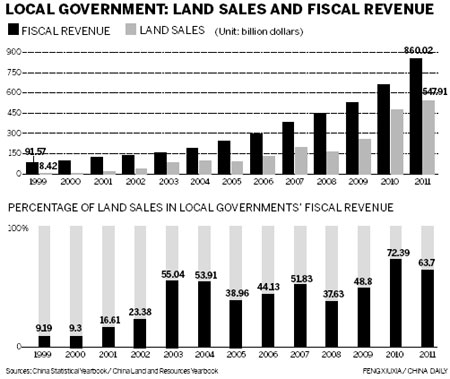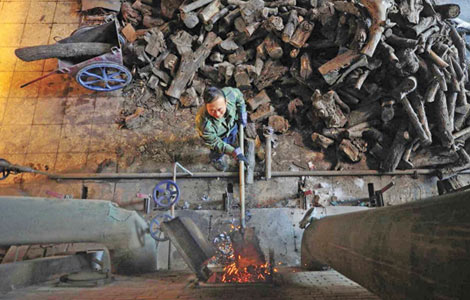Laws bring reduction in forced demolition
Updated: 2013-10-14 06:53
By Tang Yue (China Daily)
|
||||||||
New rules help keep violent incidents and confrontations in check, Tang Yue reports in Beijing.
For years, journalist Chen Baocheng wrote about other people's lives, covering stories on the judiciary and law enforcement issues.
However, the 34-year-old recently found himself in the headlines. In August, the Beijing reporter was briefly detained for allegedly holding a man against his will for a day during a protest over forced home demolitions in Chen's hometown of Pingdu, Shandong province.
Police claimed that Chen and a number of his fellow villagers had poured several bottles of gasoline over the man, a construction worker, and threatened to set him on fire. Chen was formally arrested last month, but as yet it is unclear whether he will face trial.
The story became a hot topic on Chinese social media. One observer, Li Gang, was more interested than the average news follower because the case reminded him of his own experiences.
Li, who is the same age as Chen, is also a reporter, but in Shanghai. Three years ago, his family home in Kaiyuan, Liaoning province, was demolished and the adjoining farmland was reclaimed by the local government without the family's consent. The move followed a three-year stalemate over compensation, Li said.
"One day they (the demolition team) just broke in early in the morning and drove my mother and my grandfather away from the house. I was in Shanghai and the news worried me greatly," he said.
"The government held my mother and grandfather in a hotel for a couple of days, until the officials were certain they wouldn't do anything extreme, such as setting themselves on fire."
When he heard the news, Li immediately joined a group of fellow villagers and traveled to a number of petition offices in Beijing. His mother went to Shenyang, the provincial capital, and moved in with her daughter and son-in-law, while his grandfather went to a nursing home, where he died last year at the age of 92.
Age of urbanization
The large-scale demolition of housing started in the early 1990s. Initially, old and shabby city dwellings were targeted, but as China embraced the age of rapid urbanization, the policy was soon expanded to include rural areas.
The process has reshaped the image of the country and the lives of its people, cleaning up the urban landscape and improving housing conditions for hundreds of millions.
However, in a country where local governments' dependency on land sales, house prices and people's awareness of their rights are all on the increase, the practice has never run smoothly.
Land sales have become an increasingly important source of revenue for local governments, rising from 9.19 percent in 1999 to 63.7 percent in 2011, according to the China Land and Resources Yearbook.
At the same time, forced demolitions have become a major source of social conflict; more than 22 percent of the mass incidents seen in China last year resulted from land acquisition and forced demolition, according to Legal Daily.
In 2009, a report by China News Service claimed that 40 percent of the cases received by the State Bureau for Letters and Calls, also known as the National Petition Office, from 2003-06 were related to forced demolitions.
The practice has given rise to an emerging phenomenon and coined a new phrase, the "nail house", which refers to people who refuse to move, for whatever reason, and whose houses stand out in an otherwise deserted and barren landscape.
Among a number of high-profile nail house cases, that of Yang Wu, a local martial arts champion, and his restaurateur wife Wu Ping, was dubbed "the coolest" by the media.
The couple, from the central municipality of Chongqing, reoccupied their home and flew the national flag from the roof, even after the developers cut off their power and water supplies, and excavated a 10-meter-deep pit around the house.
The couple frequently gave interviews and issued news releases to generate publicity, before finally settling with the developers in 2007 after a three-year stalemate.
New regulations
However, not every property dispute is resolved without injury or, sometimes, even death.
In one notable case, Tang Fuzhen, 47, a resident of Chengdu, the capital of Southwest China's Sichuan province, committed suicide in 2009 by setting herself on fire to protest the forced demolition of her house.
Tang's story prompted five law professors at Peking University to submit an open letter to the National People's Congress, the country's top legislative body, urging revision of the demolition regulations, a move that attracted great public attention.
Under the law at the time, which came into force in 2001, local governments were allowed to enforce demolitions at their own will, but in 2011, new regulations were issued to put an end to the practice.
The new law also made it illegal for developers or governments to cut water and power supplies during the relocation process. Moreover, forced demolitions could only be carried out if the developers obtained a court order allowing them to do so.
Since being enacted, the 2011 regulations have helped reduce the number of conflicts resulting from demolitions in the cities, according to lawyers.
"Local governments are more cautious in their behavior and cases of forced demolition in cities have declined," said Yang Zaiming, a well-known lawyer who specializes in demolition lawsuits.
However, problems have continued in the countryside because most farmers are not fully aware of their legal rights under the current law, he said.
"Farmers are less clued-up in terms of the legal aspects than urban citizens and they are more afraid of the government if conflicts arise," he added.
"Sometimes, it is true you can see the farmers have signed the consent form, but often they do so as a result of continual intimidation and harassment."
Moreover, some forced demolitions are carried out by gangs of workers employed by local governments, rather than by full-time government staff, according to an annual report on demolition by Wang Cailiang, another lawyer who specializes in demolition cases.
The rural regulations have set a ceiling on the level of compensation that can be paid, stating that it cannot exceed 30 times the average annual production value of the land in the three years prior to acquisition.
"In most cases, it is no more than 60,000 yuan ($9,800) per mu (a Chinese measurement equivalent to 0.06667 of a hectare), which translates to less than 100 yuan per square meter. It's no surprise that the people are unhappy," said Jiang Ming'an, one of the law professors who wrote the open letter in 2009.
The issue has also caught the attention of the central government. Early last year, then Premier Wen Jiabao noted that although land is the farmers' most important possession, their rights have not been fully protected.
Wen said the law needs to be revised, but no clear schedule has yet been revealed.
Tao Zhen, an expert on public policy with the Shanghai Administration Institute, argued that the lives of farmers after losing their land should also be taken into consideration.
"It has been a notable problem that many farmers become jobless and have no access to social welfare once their land has been acquired," he wrote in an article published in Study Times, the Communist Party of China's leading theoretical journal. He urged greater transparency in the land-acquisition process and suggested an overhaul of the system of employment training.
Other side of the coin
The local governments have also put forward their side of the story. In a recent interview with Xinhua News Agency, Geng Yanbo, the mayor of Taiyuan city, the capital of Shanxi province, said: "The toleration of nail houses is unfair to most people. If those who ask for an unreasonable amount of compensation benefit in the end, social order will be disrupted."

Wang Cailiang's report acknowledged that some farmers push for a higher level of compensation by extending their houses shortly before demolition is carried out.
"Learning from the local government, they know it is easier to get rich by planting houses than crops," he wrote. Wang's assertion was backed up by an official who worked in the relocation department of Yunnan province from 2004-06, and who spoke to China Daily on condition of anonymity.
"I've seen some farmers add two floors to their house just a few days prior to demolition," said lawyer Yang, who acknowledged that while some people manage to obtain more compensation than they are entitled to, the number is far lower than those whose payout is less than they legally deserve.
"There are accurate reports of some farmers becoming millionaires or even richer overnight through demolition compensation, but that only really happens in the suburbs of large cities such as Beijing and Shanghai. It's not the case for most farmers," he said.
Li Gang's family was initially offered 130,000 yuan as compensation for the loss of their 60-square-meter house and the acquisition of approximately 2 mu of farmland (roughly 1,333 sq m).
However, in September, the family finally accepted compensation of approximately 440,000 yuan, after a three-year battle, during which Li's mother traveled to Beijing a dozen times to petition various officials.
"It's not that we're greedy. It's just really unfair. The houses that now occupy our old village sell for thousands of yuan per square meter, but most of the villagers received so little for their loss," said Li.
Contact the writer at tangyue@chinadaily.com.cn
Yang Wanli and Zhao Xu contributed to this story.
|
People watch a house being demolished in Wenling city, Zhejiang province, after its owner reached an agreement with the local government. Jin Yunguo / for China Daily |
|
Some residents still remain at Qutun village in Zhejiang province. They are asking for more reasonable compensation. Li Ruichang / for China Daily |

(China Daily USA 10/14/2013 page6)

 Senate leads hunt for shutdown and debt deal
Senate leads hunt for shutdown and debt deal
 Chinese education for Thai students
Chinese education for Thai students
 Rioting erupts in Moscow
Rioting erupts in Moscow
 Djokovic retains Shanghai Masters title
Djokovic retains Shanghai Masters title
 Working group to discuss sea issues
Working group to discuss sea issues
 Draft regulation raises fines for polluters
Draft regulation raises fines for polluters
 Other measures for the capital to become green
Other measures for the capital to become green
 Colombian takes wingsuit crown
Colombian takes wingsuit crown
Most Viewed
Editor's Picks

|

|

|

|

|

|
Today's Top News
90 killed in stampede in central India
Senate leader 'confident' fiscal crisis can be averted
China's Sept CPI rose 3.1%
No new findings over Arafat's death: official
Chinese firm joins UK airport enterprise
Working group to discuss sea issues
Man hospitalized years after amputating own leg
Detained US citizen dies in Egypt
US Weekly

|

|









